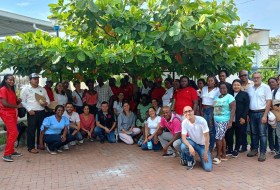News
Researchers from the Ministry of Health and Unicauca are joining efforts to measure the impacts of mercury
He study conducted from September to December 2023 identified chronic diseases, precursors of cardiovascular diseases, and gingival lesions that could indicate mercury exposure in some individuals from the Black community in the village of Pílamo, El Palenque, Guachené.
With the aim of establishing an epidemiological profile and measuring environmental factors related to mercury and their impact on the health of the community, researchers from the Faculty of Health Sciences at the University of Cauca and the Ministry of Health have joined forces in a study on the impact of mercury on the health of the Black community in the village of Pílamo, municipality of Guachené, Cauca.
The study, which involves active community participation with significant social impact, is titled "Mixed Qualitative and Quantitative Epidemiological Study of the Community Council of the Black Community of Pílamo El Palenque in Guachené Cauca." It was carried out by a team of researchers from the Faculty of Health Sciences, including professors Claudia Patricia Acosta, María Virginia Pinzón, Rosa Elvira Álvarez, Isabel Muñoz Zambrano, and Andrés Quiroga. Also contributing were professors from the Environmental Engineering program, Paulo Espinosa and Rodrigo Sarria, with collaboration from Javier Leyton, Juan Pablo Bonilla, Bibiana Díaz Tenorio, Johana Becerra Perenguez, Marcela Torres, and Steven Balcázar.

Provided photo
According to Professor Isabel Muñoz Zambrano, the National Household Survey conducted by DANE was used to identify sociodemographic aspects, housing conditions, occupational situations, sanitation, and economic factors. Additionally, medical and psychological assessments were conducted to establish the health status of the vulnerable population in the community. Furthermore, water, sediment, and hair samples were taken to determine the presence of mercury and assess the extent of health damage.
"After the medical evaluation, the main identified problems were chronic diseases such as high blood pressure, diabetes, overweight, and obesity, which are precursors to cardiovascular diseases. The discovery of gingival lesions could indicate mercury exposure in some individuals in the community, an association that will need to be confirmed in future studies using biomarkers. Measurements of mercury from biological hair samples revealed accumulation of this compound at low exposure levels in the community residents," stated Professor Isabel.
From this University, whose mission includes being supportive and demonstrating its strong commitment to the community through actions, we are deeply proud that our professors are involved in research that will play a crucial role in shaping public health policies. These investigations will not only contribute to improving living conditions and well-being in our communities but also promote safer and more sustainable environmental practices. By engaging in these projects, our faculty members not only advance scientific knowledge but also reaffirm our institutional commitment to the development and care of our department's communities. This dedication to research and community action reflects the reasons why we continue to position ourselves as a heritage for all.


